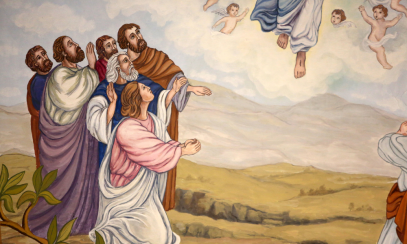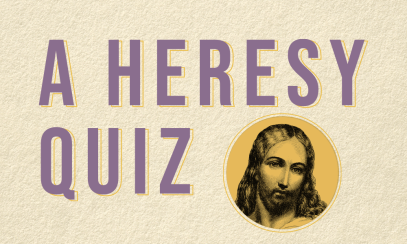Why Does Jesus Always Refer to Himself as the Son of Man, Rather Than the Son of God?
Who is Christ? A Year-Long Conversation With Theologians.
Who is Christ? A Year-Long Conversation With Theologians.
This year, FAITH is exploring Christology – the study of Jesus Christ. We asked several eminent seminary professors some questions about Jesus. Their answers are enlightening and thought-provoking.
Father Thomas Acklin is on the faculty of St. Vincent Abbey in Latrobe, PA. He is a graduate of Duqesne University, St. Vincent Seminary, The Catholic University of Louvain and Pittsburgh Psychoanalytic Institute.
Father Earl Muller is on the faculty at Sacred Heart Seminary in Detroit. He formerly taught at Marquette University in Wisconsin.
Father Gladstone Stevens is on the faculty of St. Mary Seminary in Baltimore.
FAITH: Why does Jesus always refer to himself as the Son of Man, rather than the Son of God? What does that mean?
Father Stevens: Jesus identifies himself as the Son of Man rather than the Son of God. The concept of the son of God is not uniquely Jewish – it also reflects Oriental kingship and emperor worship. Why didn’t Jesus then identify himself as the Messiah, as understood by the Jews? He was reluctant to adopt this due to its connotations of earthly glory and power. The concept of the Son of God is a way of speaking of David, and Jesus does align himself with that occasionally. He clearly does believe himself to be the Messiah.
The son of man is based on the mysterious figure from the Book of Daniel. Somehow, this figure’s purpose is not to establish earthly rule, but to mediate. Jesus, the Son of Man and Son of God, bridges the gap between the world of God and the world of humanity.
Father Acklin: The term “Son of God” could be used for angels, saints, holy persons and prophets. In Jewish understanding, it did not mean what we now understand it to mean. It is rather a lot like our word “mankind,” meaning all of humanity. The son of man is the name used in Ezekiel by God when he is addressing the prophet – thereby addressing all human beings. The other meaning is found in the prophet Daniel, referring to the whole nation of Israel. The son of man comes as the whole nation rising up to heaven, just like the dry bones in Ezekiel. Jesus speaks of himself in the third person as the Son of Man to say “I.” He sometimes silences those who call him by “Messiah” and “Son of God,” preferring to call himself the Son of Man as suffering servant, whose suffering is for all people.
Father Muller: The term “son of man” is generally considered to be an allusion to Daniel, chapter 7. In that book, it appears to have the sense of Israel corporately being given dominion and authority. But from that time to the time of Jesus, the understanding of the term changed to apply to the personified nature of a messianic and eschatological figure. It is in this context that Jesus applies that term to himself. A number of Scripture scholars would have seen nothing more than the kind of reference that you would get in Ezekiel, where the prophet himself is referred to as the son of man. Jesus clearly intends more by this term than human descent. He attaches eschatological significance to the term.
The clearest examples of Jesus as the Son of God are in John’s Gospel, where he talks explicitly about his relationship to the Father. Even in the synoptics, he distinguishes himself from the rest of us when he says things like, “your father and my father.” In a variety of oblique ways, Jesus makes the claim of being the Son of God.
What are the synoptics?
The Gospels of Matthew, Mark and Luke.
What is messianic?
Pertaining to the Messiah.
What is eschatology?
The branch of theology concerned with the end of the world.
Theologian of the month – Augustine of Hippo (354-430)
Aurelius Augustinius was one of the pre-eminent theologians in the development of the Western church.
His teachings on salvation and grace were cited by many Protestant reformers as they developed their systems of thought.
He was born in North Africa to St. Monica, a Catholic and Patricius, a pagan.
Augustine himself was a Manichaean and devoted to pleasure; he had a 15-year illicit affair with a young woman who bore him a son. His famous prayer was “Lord, grant me chastity and continence, but not yet.”
In 386, Augustine had a profound personal conversion experience, and completely changed his life. He studied Platonic thought, which continued to influence him in many ways, created a monastic foundation and was ordained. Eventually, he was made bishop of Hippo.
Heresy!
Jesus as two persons? The heresy of Nestorianism
Mary – mother of God? Nestorianists believed that Jesus was two persons: human and divine. With this teaching, we run into a problem with the crucifixion – who died on the cross? The heresy takes its name from Nestorius, a monk who became the patriarch of Constantinople and who denied the doctrine of theotokos – that Mary was the mother of God. In 431, the Council of Ephesus denounced this position and declared that Jesus had two distinct natures, human and divine, fully and inseparably present in one person. Nestorius was removed from his position as patriarch and exiled.
Nestorianism itself survived for several hundred more years.
What does that symbol mean?
INRI and IHS
These letters are often seen as representative of Christ. IHS stands for the first three letters of the name of Jesus in Greek. INRI are the first letters of the Latin inscription that was ordered placed on the cross by Pilate – “Jesus of Nazareth, King of the Jews.”



